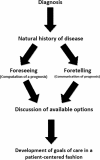Prognosis: the "missing link" within the CanMEDS competency framework
- PMID: 24886446
- PMCID: PMC4026055
- DOI: 10.1186/1472-6920-14-93
Prognosis: the "missing link" within the CanMEDS competency framework
Abstract
Background: The concept of prognosis dates back to antiquity. Quantum advances in diagnostics and therapeutics have relegated this once highly valued core competency to an almost negligible role in modern medical practice. Medical curricula are devoid of teaching opportunities focused on prognosis. This void is driven by a corresponding relative dearth within physician competency frameworks. This study aims to assess the level of content related to prognosis within CanMEDS (Canadian Medical Education Directives for Specialists), a leading and prototypical physician competency framework.
Methods: A quantitative content analysis of CanMEDS competency framework was carried out to measure the extent of this deficiency. Foxit Reader 5.1 (Foxit Corporation), a keyword scanning software, was used to assess the CanMEDS 2005 framework documents of 29 physician specialties and 37 subspecialties across the seven physician roles (medical expert, communicator, collaborator, manager, health advocate, scholar, and professional). The keywords used in the search included prognosis, prognostic, prognosticate, and prognostication.
Results: Of the 29 specialties six (20.7%) contained at least one citation of the keyword "prognosis", and one (3.4%) contained one citation of the keyword "prognostic". Of the 37 subspecialties, sixteen (43.2%) contained at least one citation of the keyword "prognosis", and three (8.1%) contained at least one citation of the keyword "prognostic". The terms "prognosticate" and "prognostication" were completely absent from all CanMEDS 2005 documents. Overall, the combined citations for "prognosis" and "prognostic" were linked with the following competency roles: Medical Expert (80.3%), Scholar (11.5%), and Communicator (8.2%).
Conclusions: Given the fundamental and foundational importance of prognosis within medical practice, it is recommended that physicians develop appropriate attitudes, skills and knowledge related to the formulation and communication of prognosis. The deficiencies within CanMEDS, demonstrated by this study, should be addressed in advance of the launch of its updated version in 2015.
Figures
Similar articles
-
Promoting medical competencies through a didactic tutor qualification programme - a qualitative study based on the CanMEDS Physician Competency Framework.BMC Med Educ. 2019 Jun 4;19(1):187. doi: 10.1186/s12909-019-1636-5. BMC Med Educ. 2019. PMID: 31164127 Free PMC article.
-
An objective structured clinical exam to measure intrinsic CanMEDS roles.Med Educ Online. 2016 Sep 15;21:31085. doi: 10.3402/meo.v21.31085. eCollection 2016. Med Educ Online. 2016. PMID: 27637267 Free PMC article.
-
How do Supervising Clinicians of a University Hospital and Associated Teaching Hospitals Rate the Relevance of the Key Competencies within the CanMEDS Roles Framework in Respect to Teaching in Clinical Clerkships?GMS Z Med Ausbild. 2015 Aug 17;32(3):Doc33. doi: 10.3205/zma000975. eCollection 2015. GMS Z Med Ausbild. 2015. PMID: 26413171 Free PMC article.
-
Can CanMEDS competencies be developed in medical school anatomy laboratories? A literature review.Int J Med Educ. 2017 Jun 16;8:231-238. doi: 10.5116/ijme.5929.4381. Int J Med Educ. 2017. PMID: 28650843 Free PMC article. Review.
-
"Teaching as a Competency": competencies for medical educators.Acad Med. 2011 Oct;86(10):1211-20. doi: 10.1097/ACM.0b013e31822c5b9a. Acad Med. 2011. PMID: 21869655 Review.
Cited by
-
The lost competency: CanMEDS-Family Medicine and prognosis.Can Fam Physician. 2015 Sep;61(9):741-2, 748-50. Can Fam Physician. 2015. PMID: 26371094 Free PMC article. No abstract available.
References
-
- Mackillop WJ. In: Prognosis in Advanced Cancer. Glare P, Christakis NA, editor. New York: Oxford University Press; 2008. Chapter 2.
-
- Hippocrates A. Book of Prognostics. 2004. Digireads.com.
-
- Bloomfield AL. Prognosis. Arch Intern Med. 1956;97:267–268. doi: 10.1001/archinte.1956.00250210013001. - DOI
-
- Christakis NA. Death foretold-Prophecy and prognosis in medical care. Chicago: The University of Chicago Press; 1999.
-
- Sobin LH, Wittekind C. TNM classification of malignant tumors. 6. New York: Wiley-Liss; 2002.
MeSH terms
LinkOut - more resources
Full Text Sources
Other Literature Sources


